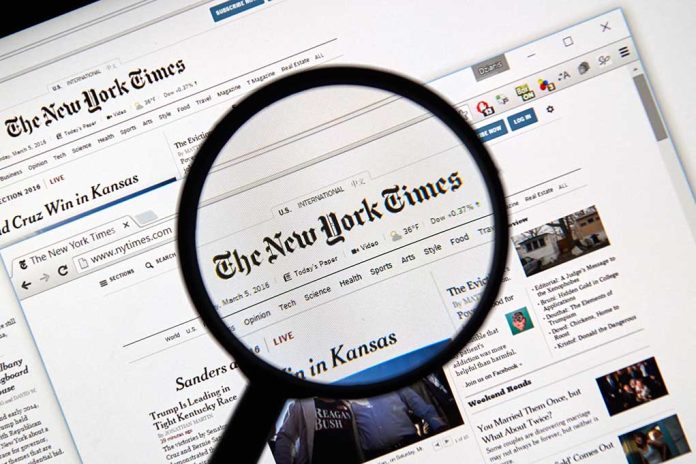
New York Times Criticizes Kamala Harris for Vague and Vacuous Interview
At a Glance
- The New York Times criticizes Vice President Kamala Harris for a superficial interview.
- Harris’s presidential campaign lacks detailed policy positions and agenda specifics.
- Journalists struggle to cover Harris’s campaign due to its lack of substance.
- The campaign is described as being based on “good vibes” rather than substantive policies.
- Harris’s recent interview with CNN’s Dana Bash was neutral in impact.
Superficial Campaign Coverage
In a recent article, The New York Times criticized Vice President Kamala Harris for her performance in a 27-minute interview, describing it as “vague” and “vacuous.” Critics argue Harris’s presidential campaign suffers from a lack of detailed policy positions and substantive agendas. Harris’s interview did little to improve her public image, which many view as insubstantial and overly controlled. Reporting on her campaign often involves superficial coverage, with media outlets resorting to publishing fluff pieces due to a lack of material.
https://www.thehill.com/opinion/campaign/4842612-kamala-harris-campaign-lack-substance
Vice President Harris’s campaign has faced substantial criticism for its lack of policy specifics. In interviews, she has appeared warm and relatable but struggled with answering questions on key issues like fracking and border security. Her responses have often been described as evasive, leading to frustration among journalists attempting to cover her campaign with substance.
Kamala Harris offers vague 'Day 1' Oval Office plan in CNN interview: 'A number of things' https://t.co/mnEVT9h5Tu
— Fox News (@FoxNews) August 30, 2024
Neutral Interview Impact
Harris’s recent interview with CNN’s Dana Bash left her critics unimpressed. Although she avoided major missteps, the interview did not significantly enhance her political reputation. During the interview, Harris defended her stance on various issues, stressing that her values have not changed, despite abandoning some liberal policies in her attempt to appeal to a broader electorate.
Moreover, Harris’s first interview as a presidential candidate was met with mockery from Republicans, who have taken issue with her avoidance of scrutiny on key policy questions, including the war in Ukraine and her proposed tax credits for first-time home buyers. Harris’s insistence on sticking to broad platitudes rather than providing concrete answers has sparked further criticism.
Defending the Administration
In the CNN interview, Harris strongly defended President Joe Biden, emphasizing his intelligence and commitment to the American people. Harris cited her experiences working closely with Biden in the Oval Office and the Situation Room as evidence of his fitness for office. Despite nervous moments, Harris grew animated when defending the president, which highlighted her loyalty and dedication to his administration’s achievements.
“I have served with President Biden for almost four years,” Harris said in defense of the president. “He truly cares so deeply about the American people. He is so smart and loyal to the American people.”
As the campaign progresses, Harris continues to face scrutiny for her perceived lack of substance and clear policy direction. The content and tone of her public engagements will play a crucial role in shaping public perception ahead of the next election cycle.
Conclusion
The New York Times article underscores ongoing concerns regarding Vice President Kamala Harris’s campaign strategy. The criticism highlights the challenges Harris faces in establishing a meaningful connection with voters and presenting robust policy proposals. Moving forward, Harris’s ability to convey clear and specific plans will be essential in addressing these concerns and improving her public image.
“Kamala Harris was asked a specific question about what she would do on Day 1 if elected as POTUS. Her answer was so vague that it was essentially worthless. Not a good start,” wrote GOP pollster Frank Luntz on X.
As Harris continues her presidential campaign, the watchful eyes of both journalists and voters will be keen to see if substantial policy discussions replace the current superficial coverage.







